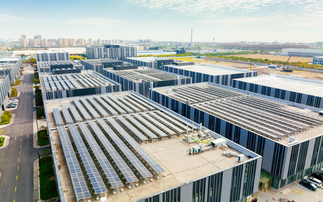Schroders' Gavin Ralston looks at how insurance investors have handled the Covid-19 crisis, their return expectations, and how they view sustainability
Most insurers saw the Covid-related market turmoil earlier this year as an opportunity to add risk to their portfolios. A full 82 per cent of insurance respondents questioned in April viewed the Covid-19 plunge in many assets as a good buying opportunity.
To me, this is a logical response for a long-term investor.
While there are no guarantees, using a crisis as a chance to pick up cheap assets in the hope that they recover over the long term can be an astute thing to do.
And it seems that insurance investors did just that. A comfortable majority (80 per cent) of those surveyed indicated that given their view of the pandemic, their future investment strategy is likely to entail looking for undervalued assets across the spectrum.
These answers suggest to me that insurance investors have been relatively resilient throughout the crisis and haven't encountered serious financial difficulties as a result of the crisis. Indeed most respondents indicated that the crisis hadn't damaged funding levels and retirement savings to such an extent that their organisation's resources were under pressure.
Overall, insurers appear to have been able to keep calm and keep invested.
Realistic return expectations?
Insurers also don't seem to have lofty future return expectations. Over the next five years the greatest proportion of respondents anticipate average annual returns in the region of 3-4 per cent.
This is in stark contrast to retail investors. Individuals expect average annual returns of nearly 11 per cent over the next five years, according to our Global Investor Study.
Interestingly, when we break down the insurance answers by region, Latin and North American respondents are the most optimistic about returns. In the former, expectations are for returns to average 5- 6 per cent while North American insurers are looking for 7-9 per cent average annual returns over the next five years. This may reflect higher interest rates in those parts of the world.
For the most part, though, it seems insurers are thinking more along the lines of our 'inescapable truths' for the coming decade. One of these truths is that equity and bond market returns are likely to be much lower in the next 10 years that they were in the prior decade.
We anticipate that bonds will return less than three per cent in most regions. On the equity side, we anticipate that developed market equity returns are likely to be in the region of 3- 4 per cent with North American and emerging market equities posting better performance.
Figure 1: Schroders' forecast for government bond returns

Figure 2: Schroders' forecast for stock market returns

Pandemics and slowdowns primary concerns
But investors are not entirely sanguine about the future. For most insurers, the fear of a continuing global slowdown or a world crisis like the Covid-19 pandemic still plays on their minds.
In the context of the year we've had in 2020, it makes sense that these two feature at the top of insurers' worry lists.
It's also telling that investors strongly believe in the ability of government and monetary authorities to come to the rescue.
What I find surprising though is that investors don't see climate change risk as particularly significant. At Schroders we believe that climate change is the biggest risk facing long-term asset owners.
Sustainable investing to become more important
Another particularly interesting area of the Study were the responses to our sustainable investing questions.
A majority (63 per cent) of respondents reported that their organisations have increased their allocations to sustainable investments. Meanwhile more than three-quarters (75 per cent) anticipate that the role of sustainable investing is going to become more important over the next five years.
The study also revealed that the most popular way of investing sustainably is to integrate environmental, social and governance (ESG) considerations into the investment process. Positive screening - focusing on ‘best in class' investments - was the second most popular.
On a regional basis, it seems the Europeans and North Americans have embraced ESG integration while it's less favoured among Asian and Latin American insurance companies.
Interestingly, we discovered that the biggest driver behind insurance investors' focus on sustainability is a need to align to corporate / internal values. It is heartening that investors have reached this conclusion independently of regulatory or public pressure. This is true across regions.
We didn't expect this result given how tightly regulated the insurance industry is.
What is holding investors back from sustainable investing?
That said, 72 per cent of insurance investors still find sustainable investing challenging. This is roughly the same as it was when we first asked this question in 2018, and is consistent with how other institutions responded to our questioning.
The Europeans seem to find it the most challenging. This is an interesting finding because, in general, sustainable investing is more established in Europe than anywhere else in the world.
When we asked why investors find it challenging, we discovered that concerns about greenwashing dominate. Greenwashing is about falsely communicating the environmental benefits of a product or service in order to make an entity seem more environmentally-friendly than it really is.
Asset managers need to do more
It's clear the asset management industry can be doing more to help investors navigate the rapidly expanding field of sustainable investing. Specifically, we should (as we already do at Schroders) be encouraging companies to provide greater transparency on financial and non-financial performance data.
This, along with evidence that sustainable investing can deliver better returns, is what respondents say they need in order to invest more sustainably.
Gavin Ralston is head of strategic client group, official institutions, at Schroders.
Schroders is a partner of the Net Zero Festival. Read more Sustainability insights from Schroders here.
About the Institutional Investor Study
Schroders' annual Institutional Investor Study analyses the investment perspectives of 650 institutional investors, of which 152 respondents are from insurance companies. These insurance companies are collectively responsible for $9.1 trillion in assets from 22 locations across North America, Europe, Latin America and Asia-Pacific.
The Study provides a snapshot of some of the world's largest investors' key areas of focus and concern. These include the macroeconomic and geopolitical climate, return expectations, asset allocation and attitudes to private assets and sustainable investing.







